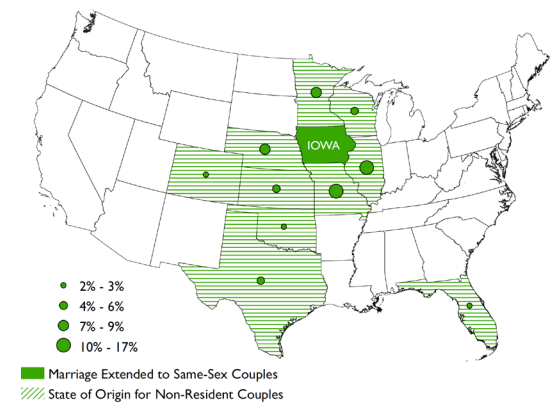The only anecdata I have on Iowa benefitting from the legalization of gay marriage are one couple I know, who got married there but had a ceremony and reception back here in Chicago. I think they stayed overnight, or at least got lunch, so we didn't miss out on much taxation (besides being from here, the upstairs at the Bottom Lounge is a great place for a reception—I've been to two there—so we've got that going for us). But how about other folks? The Williams Institute at UCLA actually looked into it (PDF), and found that we're getting a modest soaking by our neighbors. The estimates are pretty rough, but it's interesting enough.
To begin with, Iowa is definitely pulling married couples from Illinois:

Illinois, as you might expect as Iowa's most populous neighbor, is number one at 17 percent. 59 percent of same-sex marriages in Iowa, in the first year after it was legalized in 2009, were to out-of-state couples. It's wasn't that many: 1,233 out of 2,099 in all, so about 210 couples from Illinois.
Then they try to break down the economic effects; the method's pretty raw:
According to The Wedding Report, the average spending on weddings in Iowa from April 2009 to April 2010 was $18,130. As in previous studies by the Williams Institute, we estimate here that same-sex couples spend one-quarter of the amount that different-sex couples spend on wedding arrangements. Due to societal discrimination, same-sex couples may receive less financial support from their parents and other family members to cover wedding costs, resulting in overall reduced spending. Accordingly, we assume that same-sex couples will have spent just over $4,500 per wedding. Using this figure, the calculated total for the reported 866 resident couples sums to $3.9 million in additional wedding spending.
Well, there's another argument for gay marriage: more acceptance, more sales tax.
The wedding expense figure is most likely lower for out-of-state couples who decide to travel to Iowa to get married. As a conservative estimate, we assume that wedding spending by out-of-state couples is one-tenth of the typical wedding expense, or $1,800. The total expenditure for the reported 1,233 nonresident couples who married in the year following the decision is $2.2 million in additional wedding spending.
Or $378,000 from Illinois residents. But that's not all the spending, obviously. There's lodging and tourism, all of which adds up:
Our calculations indicate that the total spending on wedding arrangements and tourism by same-sex couples and their guests was about $12 to $13 million in the first year alone. We estimate that this economic boost generated about $850,000 to $930,000 in tax revenue for the state and various localities.
It is important to note that allowing out-of-state same-sex couples the opportunity to wed resulted in an influx of $4.6 to $5.7 million for Iowa businesses. This increase accounted for about 40%-44% of the total tax revenue generated from the 2,099 marriages by same-sex couples.
The overall spending was even higher if any of the over one thousand couples who did not list their sex were same-sex couples. Our estimates here would increase to $20 million when including spending by those additional 1,015 couples. This increase in spending would translate to an additional $530,000 in tax revenue, resulting in an overall total of $1.5 million for state and local governments.
Total non-resident tax revenue: $333,404 to $415,688. Assuming 17 percent of that came from Illinois residents (who pay a lower sales tax in Iowa), that's about $56,700 to $70,700. It's not a lot, but love can buy you a little money.


